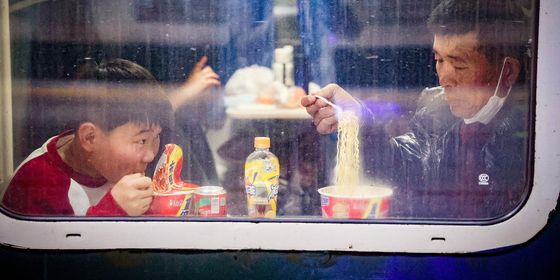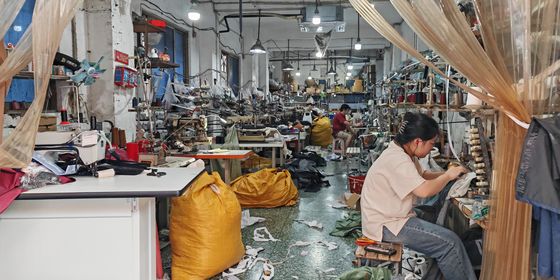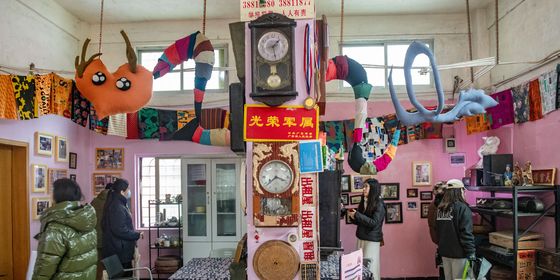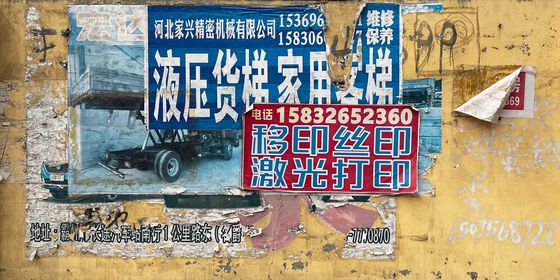The complex culture of Nanjing’s migrant vendors
A few hours before the sun goes down, Yaojia Road on the outskirts of Nanjing becomes a confluence of beeping vehicles. Buses, trucks, and cars push their way through traffic as best they can so that, at 5 p.m. on the dot, vendors can unload restaurant canopies, cooking facilities, meats, and vegetables from their vehicles, forming broken lines of smoke and sticks. Behind the hot coals and warm bottles of beer, there is a tale of petty gangsters, violence, and local power grabs—a masculine opera of honor and hope.
I spent 11 months studying the curious cultural complexities of this market of migrants. They come from villages, townships, and hinterland provinces as far as Sichuan and Shanxi, all to make an odd home in Nanjing. Having moved since writing, the Yaohuamen market is still a melting pot of migrants constantly on the move; still, names herein have been changed to keep certain parties anonymous and the market has been renovated since writing.
My own journey began, not entirely unusually, as an academic pursuit, but research began in earnest when Mr. Han gave me a job in his kitchen. Born in a poor mountainous region in Sichuan, Han learned cooking in Beijing when he was a teenager. He quit his last job (or was fired) in Beijing, he says, for throwing burning charcoal at one of his customers. He cooks 50 to 60 barbecue fish dishes a night and has no rival. Naturally, Han was suspicious of my credentials, doubtful that anyone would want to study such “insignificant” people. Thus began my internship, paid in free meals and information.
But research is not built on anecdotes (though the story of the migrant communities there certainly should be), so other methods were employed: surveys, family trees, maps, and work histories, as well as accepting jobs in other kitchens and stalls.
The internet and foreign media abound with tales of the quaint quality of the street markets—the smells, the tastes, and the colorful characters. But all these novelties fail to mention that a community is being built, one that seemingly relies on the optimism and urbanization of the early 2000s, creating a strange, insular micro-culture.
The notorious chengguan, the police charged with urban management, are none too happy with the existence of the Yaohuamen market, but the levies, stall transfer fees, gift cigarettes, and red envelopes keep the market churning—that and the affordable fare it serves. Blue collar workers, migrant factory workers, relocated farmers, truck drivers, and sojourning business people are loyal customers here, along with the occasional prostitute or hooligan. It is here, in this chaotic hodgepodge that we find our society, or shehui (社会), a disorderly yet highly vibrant fate of many Chinese migrants. In this underclass world, an outlaw-esque “rivers and lakes” mentality (江湖 jiānghú) reigns supreme.
Rule by Rowdy Ghosts
“You never know if these beer caps are tainted with blood,” Brother Dragon told me as I helped him distribute bottled beer to local restaurants. Beer bottles make an excellent cudgel in the drunken hours of the night markets, and Brother Dragon is no stranger to that sort of violence.
One of the most curious and perhaps most interesting facets of the Yaohuamen market, and many migrant markets like it, are the “living rowdy ghosts (活闹鬼 huónàoguǐ),” a local term for hooligans and street strongmen who are essential to the micro-society of the market. In Chinese, “ghost” can mean a spectral being, but it can also refer to unfilial children; rowdy ghosts often begin as delinquents, the family’s black sheep, and they grow to be a painful but integral part of the market society. If a market has a reputation for intoxication, gang violence, vandalism, racketeering, and extortion, you’ll be sure to find a few rowdy ghosts running about.
One stall, called Vision Barbecue, was run by a young couple full of naiveté who didn’t see the effects of theses hooligans coming—least of all from their landlord. He took loans from the young couple, demanded absurd sums of money, and had his family and friends eat there for free. The landlord’s nephew, it turned out, was a rowdy ghost, an inveterate gambler and hoodlum who threatened the couple openly in public. Even with the mediation of a regulatory agency, the couple was forced to close the stand. It was a crash course in the rule by rowdy ghosts in the Yaohuamen market.
A more shrewd vendor, Brother Fei, took the initiative to invite several local “big households” (大户 dàhù) to his stand for a dinner as soon as he started his business; at the banquet, he asked these new neighbors to “take care” of his business. According to Brother Fei, hosting a banquet is a routine for him whenever he starts a business in a new place, a great way to connect with local heavies and get insider information about reliable leasers. This type of initiation is often referred as “worshiping ghosts” (拜鬼 bàiguǐ); “worshipping bodhisattvas” (拜菩萨 bài púsà), on the other hand, refers to building similar connections with local officials or policemen. Few in the market can afford to do the latter, so most rely on the neighborhood ghosts.
Vendors need to keep a level head and play the intimidation game if they want to keep their stalls. Old Wang, a veteran outdoor restaurant boss, takes the initiative by finding the rowdy ghosts first; they often approach his stall for free meals. Old Wang is an old hand, so he knows that getting a free meal is a test for the head of the gang, meant for the “little brothers” to see. So, after lighting his cigarettes and inviting him to patronize the restaurant in the future, Wang treats the gang’s leader to a meal. If the rowdy ghost goes away feeling respected, he and his followers will be less aggressive and will probably pay for their next meal. The “little brothers” though, Old Wang points out, can’t be controlled. They are always looking to show how big and bad they can be.
Though it might seem like something mentioned in a guidebook as being quaint or full of life, the night market life can be brutal. It’s a world where men call each other “brother,” a world where meat, beer, and wine are shared and where fighting is a foregone conclusion, a miniature Valhalla with barbecue fish. This toxic testosterone rules the market’s politics at every level. But despite these harrowing experiences and seemingly terrifying local politics, the market is also a place of hope. Young people come from the countryside and from factories and farms, all looking for a better life in this market.
From Factories and Farms
In conflict, people have a raving need to validate their authenticity and manliness with soldierly sentiment. The fighting is the polar extreme of this brotherly authenticity. Beer bottles are a weapon, yes, but they are also the measure by which the effects of conflict are ameliorated. Going drink-for-drink means solidarity and peace are restored. It’s not just the bosses; stall owners and customers alike call each other “brother” as if to summon the warmth of the families they left behind.
The market migrants come from all over China, in their own way a symbol of the changing economic landscape in China. Many are constantly on the move. Young people in their 20s or 30s head for the big cities to become entrepreneurs, following a different path from the elder generation. While their enrollment into urban factories is facilitated by the state, much like their elder generation, the market is a new frontier.
“Do you know how many cities I’ve lived in since leaving home at the age of 15?” Liu from Shandong asked me. “Six.” He’s been a farm hand, factory worker, mutton soup vendor, salesman, and much more. The nomads of China’s migrant class can find solace and community in the strange night markets where food, bravado, and money are languages everyone can understand.
Skilled graduates from vocational schools enjoy high employability, but many young vendors traded jobs in the Economic Development Zone for the night market. Jobs in factories leave workers wanting, primarily because the chances of getting promoted are slim and the working hours are long and monotonous. Many vendors say they couldn’t last “three days” in such an environment.
The youngsters are driven to the markets, where the hours are more amenable, the work more varied, and the community much more amiable—but there are also more risks. The creation of the night market might be contextualized in the concept of contemporary urban transformation, of meeting the demands of a growing population of urban residents and migrant workers always on the move.
Passing them on the street, migrant vendors are not, as one first suspects, the powerless and marginalized of society, all equally under the yoke of entrepreneurship in the market economy. This is simply untrue. The politics of the migrant street markets are every bit as cutthroat as any corporate board room.
Studying the odd and perhaps arcane cultural implications of a night market shows both what migrants do for a city and what the city does to the migrants. The people found on that dark Yaohuamen market are indicative of a nation on the up, on the move, and out for everything they can get. And they’re just getting started.
Bottles and Brothers
“Stay here. Do not leave, if you have the balls. If I don’t use a knife on you tonight, I won’t have the face to get by in this street anymore,” Yin the Younger, a vendor of the night market, shouted at a frequent customer at Han’s stand. Yin breathed heavily, stinking of alcohol. Two vendors were holding him back and all hell was breaking loose in the market—which isn’t uncommon. The cause of the brawl? According to Yin, he saw Liu and tried to toast him with a cup of beer. Liu turned Yin down and threw his beer to the ground, sneering, “You will always be beneath me!”
All of this, and the violence that would follow, dated back to a supposed 200 RMB overcharge from Yin to Liu when the latter ate at the former’s stand several days ago, playing out a perfect scene of the “rivers and lakes” masculinity that so embodies these migrant street market communities. Liu bragged that he earns over 5,000 RMB a month as a train conductor, so he would have no need to cheat the bill. Yin countered with his supposed mob contacts and more than “10 brothers” in prison to whom he sends money. Liu countered this counter with a claim that he could “mobilize 100 staff from the railway” to fight for him.
Then, bang. Yin mutilated himself in defiance, bashing a beer bottle over his own head, white foam running on the concrete.
Han, the man who gave me my first job in the market (and ever the peacemaker) intervened by taking the half-bottle away from Yin and dragging Liu to the opposite side of the street. Yin tried to follow, and when I and others tried to stop them, we were hit and kicked.
After another half-hour the fight came to its end. Han managed to have both parties seated at his stand with three bottles of beer placed before Yin, Liu, and himself. Han asked Liu to fill the cup and toast Yin first to apologize for insulting him. Then, he ordered Yin to fill the empty plastic cup for Liu, and both of them drank and agreed not to pursue malicious intentions. When it was Liu’s turn to fill the cup for Yin, he made a sentimental speech, stating that it would be the last banquet he would have at the night market.
“Brother Han, I didn’t tell you that we are leaving next Monday, and perhaps not coming back. You know us train guys are just like soldiers,” he turned to Yin. “I come from the North; you are also from the North. Why do we leave our hometowns? It is only for good fortune...Let me toast you.”
He drank the full cup in one go and thanked Han for his care. He left the table, and Yin did not stop him.
Breaking Brother Dragon
Brother Dragon is a respected rowdy ghost. He graduated from an institute of physical education and has been working in the night market for more than a decade. He used to be the hired thug of a nearby produce market and got a foothold in the alcohol business, which meant he could control his own little market monopoly.
But, where there is money, there are turf wars. In spite of his years of control and clout, before I left the night market, a gang of younger and tougher ghosts rushed from a minibus one night, each with watermelon knives, to fight Brother Dragon’s crew. Both parties agreed not to call the police; prison was the last thing any of them wanted. The fight didn’t last long and one young man’s wrist tendons were slashed, but there wasn’t much in the way of actual bloodshed.
Brother Dragon’s gang, however, was defeated. In the following days, the winners began their promotion of a new brand of beer. The defeated Brother Dragon could only stand next to heaps of his beer boxes stacked in the corner of the night market, cursing the new patrons.
Fat Man and Pebble Zhang
As everyone in the market knows, Pebble Zhang’s profitable stall once belonged to Fat Man. Despite being only about 20 meters away from Pebble Zhang, Fat Man’s stand can only sell about 10 barbecue fish dishes a night, while Pebble Zhang’s can hit 60 or 70. Fat Man often has no business and nothing to do after 9 p.m., but he can be seen straining his neck to see how many fish Pebble Zhang is selling.
Fat Man, you see, used to make rice balls, but then moved onto the more profitable barbecue fish with a secret recipe he claims to have perfected. His barbecue fish became a hit.
But when Fat Man returned to Nanjing from a Spring Festival visit to his hometown, he found that the marketplace had been rearranged, with Pebble Zhang in his old spot. Bargaining fell on deaf ears, with Pebble Zhang asking for 50,000 RMB. Fat Man had no way to defend his interests, because Pebble Zhang’s brother-in-law was an “apprentice” to the head of the realty management company in charge of the night market, a supposed enforcer with a penchant for beating migrant workers.
To make matters worse, Pebble Zhang, according to Fat Man, stole the original owner’s barbecue fish recipe, claiming he did so by picking through the garbage station behind Fat Man’s old kitchen.
However, a veteran of the rivers and lakes drama, Fat Man had his own tactics; he befriended Brother Dragon, a distributor and a “living rowdy ghost” who monopolized the beer supply in the market. Fat Man bided his time until one night, after too many beers, Brother Dragon got drunk and urinated in public. This scandalous behavior from a well-known figure soured his standing with the market’s regulars—but not Fat Man. Seeing an opportunity that night, Fat Man kindly escorted Brother Dragon home to avoid further damage to his reputation.
Their power combined, they formed a mutually beneficial monopoly on the fish sales in the market by instituting a 2 RMB-per-kilo “commission fee” on the suppliers—a scheme that turned out to be rather profitable. His stall may not sell the most fish, but Fat Man kept his reputation in the society via the favor of a friendly rowdy ghost.
Fat Man can be seen walking a dog in the market most nights. Brother Dragon had tried to raise the dog, named Little Tiger, to be a fierce and loyal hound, but it turned out to be a cowardly little mutt. Fat Man liked the dog, and as he walks it up and down the market streets, he tells anyone who will listen that it was a gift from Brother Dragon.
Edited by Tyler Roney
Photography by Chen Liang
Dark Was the Night Market is a story from our issue, “Taobao Town.” To read the entire issue, become a subscriber and receive the full magazine.












